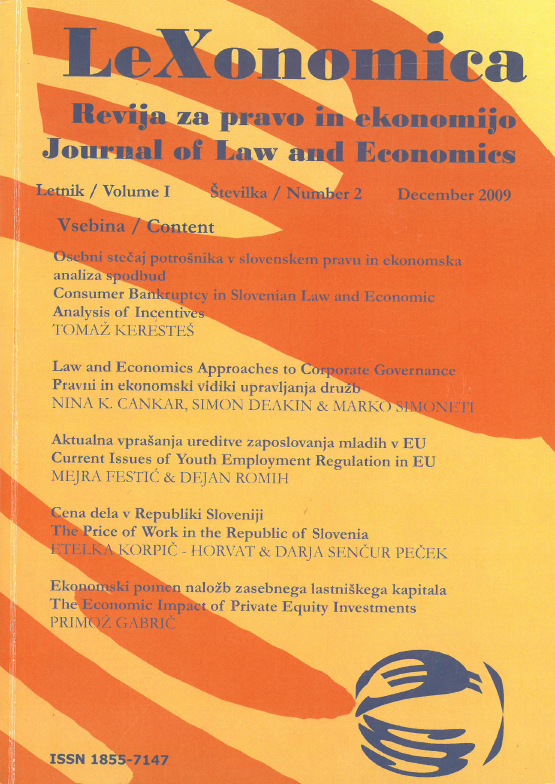Aktualna vprašanja ureditve zaposlovanja mladih v EU
Keywords:
youth, employment, education, programmes, European UnionAbstract
Current issues of youth employment regulation in the EU. European strategy for youth employment 2005?2008 (2005/600/EC) directs economic policies with the purpose of attaining sustainable development in the EU through the guidelines of youth employment policy. Integrated youth employment policy concerns different segments of economy and scoops a complete image of youth position in society. Young labour force should be protected against potential abuse of employees in the case of atypical employment contracts. Somewhere, the young labour force is likely to be employed due to lower employment costs and because youth are more prone to innovations. The institutions of labour market should contribute to better dialogue between employees and educational institutions. A better relations between tertiary education and needs of economy demands vocational training programmes to be a part of formal education process. Reforms of education systems should contribute to lower share of youth, who are leaving the formal education process early or who do not finish it. The reforms should also contribute to lower segregation of the labour market.
Povzetek. Evropska strategija zaposlovanja mladih 2005?2008 (2005/600/EC) usmerja ekonomske politike z namenom zagotavljanja trajnostnega razvoja Evrope prek smernic politike zaposlovanja mladih. Integrirana politika zaposlovanja mladih se nanaša na več segmentov in zajema celostno podobo položaja mladih v družbi. Mlade bi bilo treba zavarovati pred zlorabami delodajalcev v primeru netipičnih pogodb o zaposlitvi. Namesto tega pa se ponekod raje zaposluje mlado delovno silo zaradi nižjih stroškov zaposlitve in večje nagnjenosti mladih k inovacijam. Institucije trga dela naj bi tako pripomogle k oblikovanju boljšega dialoga na nacionalni, regionalni in lokalni ravni med delodajalci in izobraževalnimi institucijami. Boljša povezava med terciarnim izobraževanjem in potrebami gospodarstva zahteva praktično usposabljanje mladih kot del formalnega izobraževanja že v času šolanja. Reforma izobraževalnega sistema naj bi pripomogla k zniževanju deleža mladih, ki zapustijo šolanje oz. ga končajo pri nizki stopnji dosežene izobrazbe, kot tudi k zmanjšanju segregacije trga dela.
Downloads
References
Betcherman, G., Godfrey M., Puerto, O. S., Rother, F., Stavreska, A. (2007) Global inventory of interventions to support young workers: synthesis report. (Washington: The World Bank).
Puerto, O., Rother, F. (2007). Interventions to Support Young Workers in OECD Countries - Regional Report for the Youth Employment Inventory (Washington: The World Bank).
Downloads
Published
Issue
Section
License
© Univerza v Mariboru, Pravna fakulteta, Univerzitetna založba
Prosti pristop
